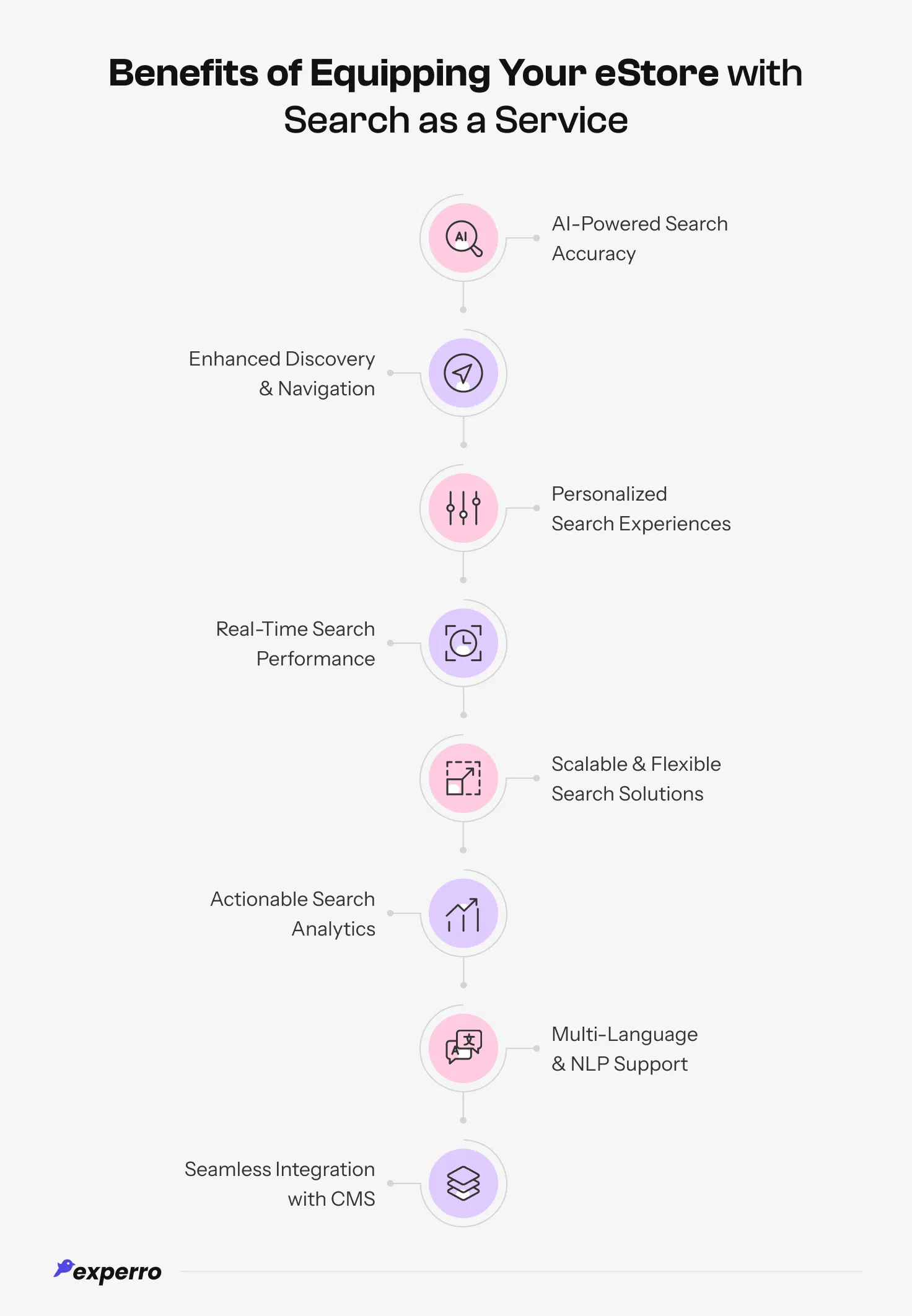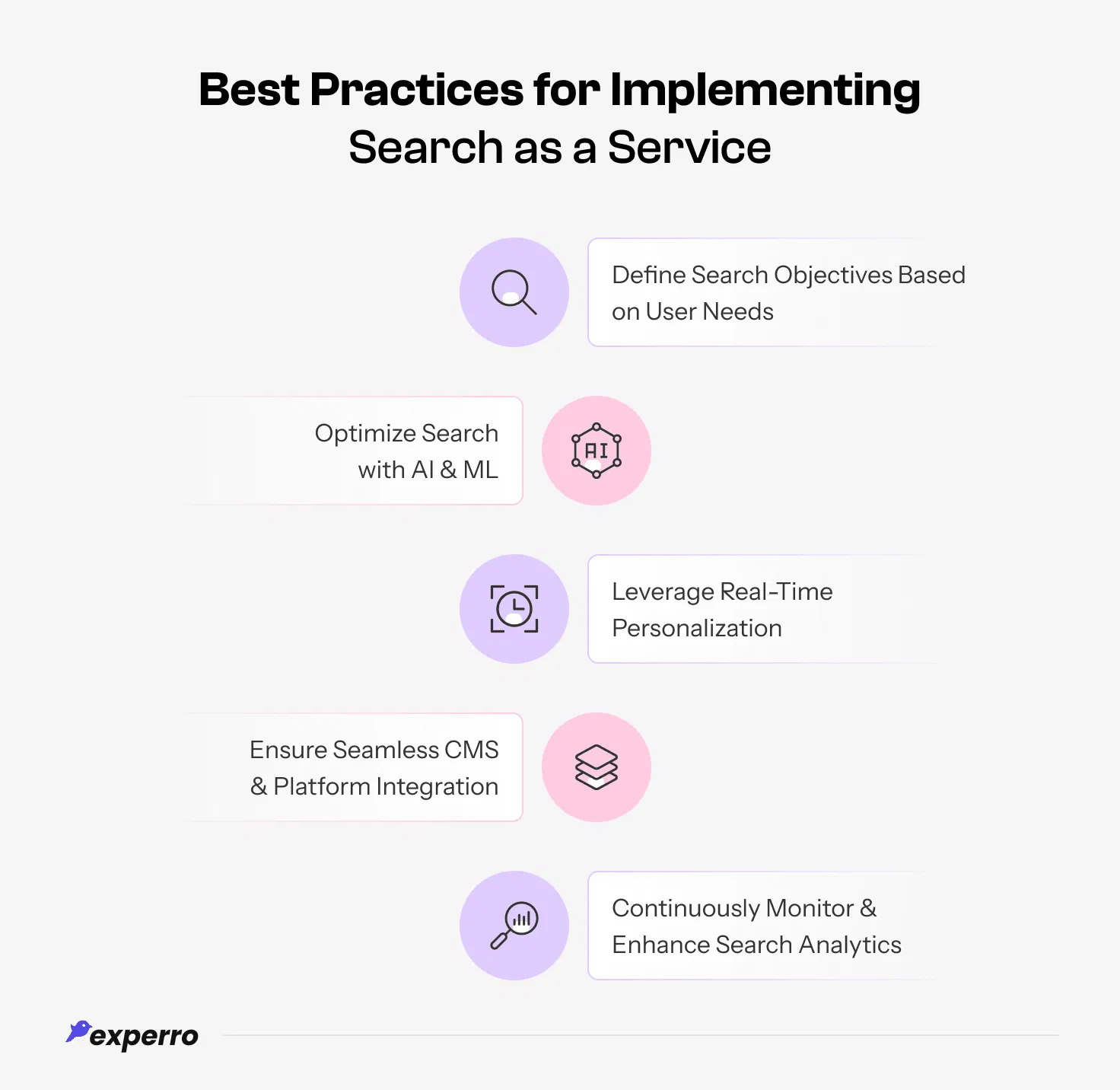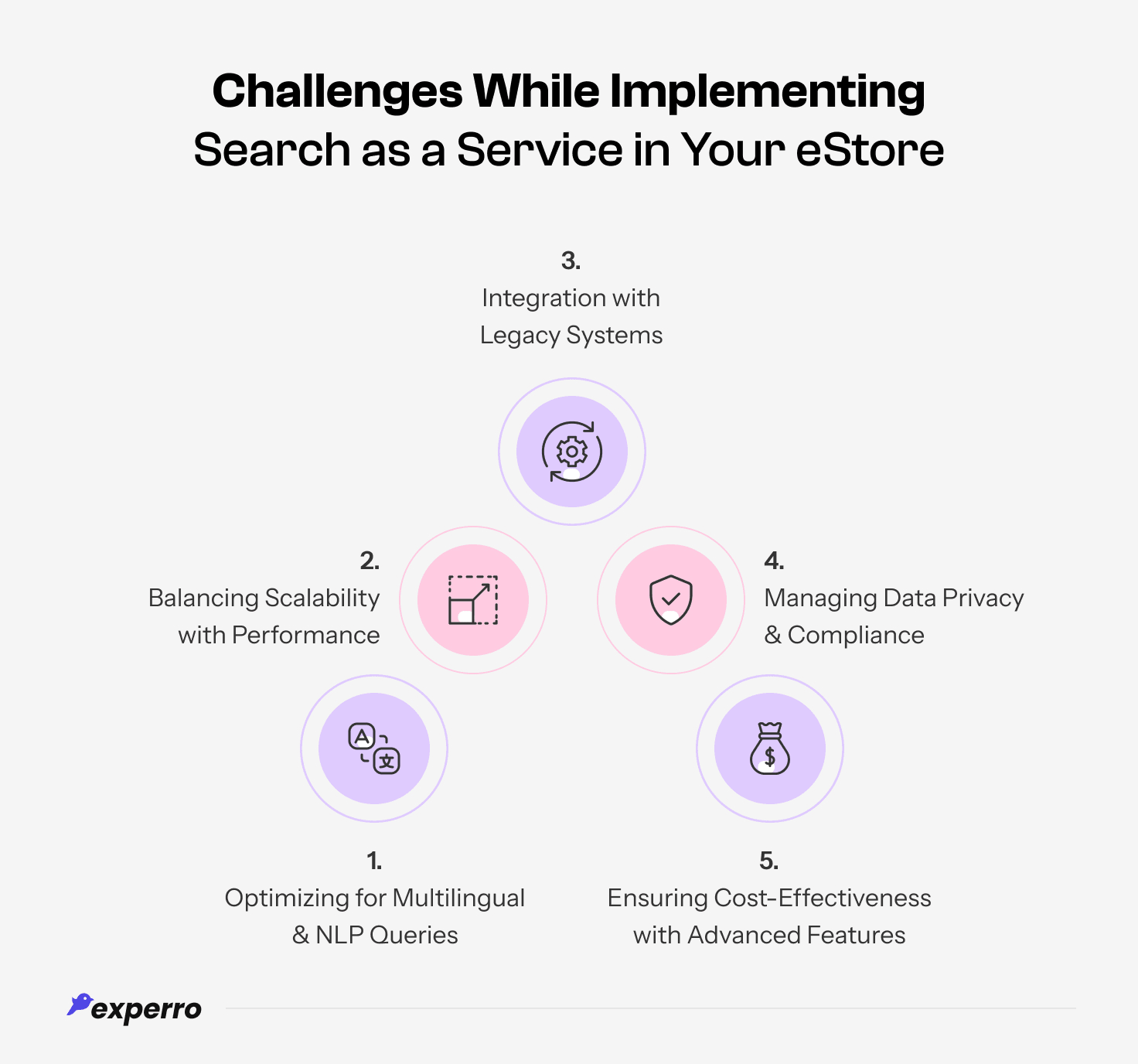- Blog
- Product Discovery
- Search
- 11 min read
What Is Search as a Service & How It Empowers Enterprises?
Published
3 December 2024Updated
13 January 2026

Core Insights Box
- Search as a service integrates effortlessly with eCommerce stores, transforming the user journey with features like real-time search, typo tolerance for fuzzy search, and search analytics.
- eCommerce businesses benefit from enhanced discovery, personalization, and actionable insights, increasing engagement and conversions.
- Experro provides AI-driven search solutions with seamless integration, empowering businesses to deliver exceptional user experiences.
Imagine a customer visiting your website, typing a query, and instantly finding what they need—no confusion, no frustration, just a seamless and engaging experience.
This is the power of Search as a service.
More than just a tool, it’s a smart, multimodal AI-driven search capabilities transforms ordinary search into an extraordinary experience.
From eCommerce platforms boosting sales with personalized recommendations to the websites delivering accurate results, Search software platforms are transforming the way users interact with digital platforms.
In this guide, we’ll dive into what search as a service is, how it works, and why it’s the game-changer your business needs.
What Is Search as a Service?

Search as a Service (SaaS) is a model where a third-party provider offers search functionality to an organization, typically through APIs and a subscription-based model, managing the infrastructure and software needed to power site search, enterprise search, or e-commerce search.
Search as a service is a solution that empowers businesses to integrate advanced eCommerce search capabilities into their e-store without migrating their existing store or building any new complex infrastructures.
Unlike traditional search engines, which rely on static algorithms, advanced search leverages AI, ML, and NLP to deliver personalized search results.
It functions as an API-driven model, offering scalability and flexibility to meet the diverse needs of businesses across industries.
Out of 81% internet users relying on search engines, 74% are engaged in online shopping.
Search technology enhances how users interact with digital platforms by making search smarter, faster, and more intuitive.
How Does Search as a Service Work?
Search as a service model operates on cloud-hosted infrastructure, where businesses integrate a search API into their digital platforms.
Here’s a simplified view of how it works:
- Data Indexing: The search as a service indexes data from various sources such as product catalogs, content databases, or user-generated content.
- Search Query Processing: When a user enters a search query, the system interprets it using NLP and AI techniques, understanding context, intent, and synonyms.
- Result Matching: It matches the query with relevant indexed content using ranking algorithms to ensure the most relevant results appear first.
- Dynamic Feedback Loop: Continuous learning from user interactions ensures the predictive search system evolves, improving accuracy and personalization.
What Are the Benefits of Search as a Service on Your Website?

Here’s how the search as a service benefits can make an impact on your business:
1. AI-Powered Search Accuracy
Search service uses AI algorithms to analyze and interpret user intent, providing precise results and search relevance.
By understanding synonyms, typos, and contextual nuances, it ensures that users find what they’re looking for without frustration. This level of accuracy enhances customer satisfaction and boosts conversion rates.
2. Enhanced Discovery and Navigation
Search engines doesn’t just help users find what they know they want—it aids in discovering what they didn’t realize they needed.
Content discovery features like faceted search, auto-suggestions, and visual search make navigating complex websites or product catalogs intuitive and enjoyable, leading to longer engagement and higher sales.
3. Personalized Search Experiences
Every user is unique, and search engines leverages machine learning to tailor search results to individual preferences.
Analyzing past interactions, preferences, and behaviors delivers hyper-personalized recommendations that create a meaningful and engaging user journey.
4. Real-Time Search Performance
Speed is critical in keeping users engaged. Search software as a service ensures lightning-fast response times, even during high-traffic periods.
Real-time indexing and instant results eliminate delays, creating a seamless customer experience and supporting business scalability.
5. Scalable and Flexible Search Solutions
As your business grows, so do your data and user demands. Search solutions are built to scale, accommodate increasing data volumes and traffic without compromising performance.
Search software as a service adapts to your needs, whether you’re a small business or an enterprise.
6. Actionable Search Analytics
Search insights are goldmines of information. Advanced search softwares provides detailed eCommerce analytics about user queries, click-through rates, and abandoned searches.
These insights empower businesses to optimize content, understand customer needs, and refine their offerings.
7. Multi-Language and NLP Support
Global businesses require solutions that cater to diverse audiences.
Search software as a service supports multiple languages and employs natural language search to understand and process search queries in different linguistic and cultural contexts, ensuring inclusivity and better engagement.
8. Seamless Integration with CMS and eCommerce Platforms
Implementing search solutions doesn’t require overhauling existing systems.
It integrates smoothly with popular CMS and eCommerce platforms, reducing operational costs, and maximizing efficiency without disrupting your workflows.
Unveil the possibilities AI creates for the future of global eCommerce

What Are the Best Practices for Implementing Search as a Service?
Implementing search as a service is a strategic process that requires thoughtful planning and continuous optimization to ensure it aligns with user expectations.

Here are expanded best practices to help you get the most out of your search-as-a-service platform:
1. Define Search Objectives Based on User Needs
Start by identifying what your users are looking for and the pain points they experience while searching. Conduct surveys, analyze user behavior, and gather feedback to understand their expectations.
Define clear objectives such as reducing bounce rates, increasing product discovery, or improving engagement metrics.
By aligning the search experience with user needs, you ensure that your search as a service solution becomes an indispensable tool for both customers and your business.
Regularly revisit these objectives to adapt to changing user behaviors and market trends.
2. Optimize Search with AI and ML
Modern search service platforms rely heavily on machine learning and generative AI for eCommerce to deliver accurate and contextual search results.
Implement features like search autocomplete, typo tolerance, and search as a service to improve precision and usability.
Train the system using relevant information and allow machine learning algorithms to refine search bar results based on user's previous interactions continuously.
This ensures that your search capabilities evolve, delivering better results over time and maintaining user satisfaction even as your content or product catalog grows.
3. Leverage Real-Time Personalization
A one-size-fits-all search strategy no longer works in today’s digital-first world. Implement personalized search as a service by leveraging data such as user demographics, purchase history, and browsing patterns.
Personalization not only improves the site search bar UI and UX but also boosts engagement and conversion rates. Use A/B testing to refine personalization strategies and measure their effectiveness continuously.
4. Ensure Seamless CMS and Platform Integration
Your search software must integrate smoothly with your existing infrastructure, such as your CMS, CRM, or eCommerce platform.
Ensure the search as a service vendor you choose provides APIs, SDKs, or plugins compatible with your current systems.
Seamless integrations avoid disruptions, accelerate deployment, and ensure that your hosted search solution enhances workflows rather than complicating them.
Test the integration thoroughly to identify any bottlenecks or compatibility issues before going live.
5. Continuously Monitor and Enhance Search Analytics
Leverage search analytics as a service to gain actionable insights into user behavior. Monitor metrics such as search query volume, click-through rates, and zero-result queries.
These insights can help you identify gaps in your content or product inventory and refine your intelligent search service platform. Regularly analyze this data to uncover trends, optimize search algorithms, and improve overall performance.
The continuous monitoring of search analytics also ensures that your search service remains responsive to evolving user needs and preferences.
6. Prioritize Speed and Reliability
Speed is critical for a successful eCommerce platform. Ensure that your search as a service solution provides sub-second response times, even during peak traffic.
A slow or unreliable search experience can frustrate users and drive them away. Opt for search solutions with robust cloud-based architectures that offer high availability and low latency.
Invest in a good website builder for in-built testing and monitoring tools to ensure consistent performance, especially during high-demand periods like Black Friday or seasonal sales.
7. Focus on Accessibility and Inclusivity
To cater to a diverse audience, your search as a service platform must be accessible to users of varying abilities and technical backgrounds.
Ensure that the system adheres to web accessibility standards, supports voice search, and provides intuitive interfaces.
Additionally, features like multi-language and NLP support allow you to engage users across different regions and cultural contexts, enhancing the inclusivity of your site search function.
8. Establish a Feedback Loop for Continuous Improvement
Create a feedback mechanism that allows users to report issues or suggest improvements.
Use this feedback to refine your search-as-a-service platform and prioritize updates. Combine user feedback with search analytics as a service to create a holistic view of areas needing improvement.
This iterative process ensures that your search service remains aligned with user expectations over time.
9. Plan for Scalability and Future Growth
Your hosted search solution should be scalable to accommodate traffic, data, and complexity growth. As your business expands, so will the demands on your search as a service platform.
Choose a solution that can handle increased workloads without compromising performance.
Scalability is about handling larger data volumes and adapting to new trends, technologies, and user behaviors, ensuring long-term success.
What Challenges Might You Face When Implementing Search as a Service?

While adopting search-as-a-service solutions offers numerous advantages, there are potential challenges to address:
1. Integration with Legacy Systems
Many businesses operate on outdated systems that can complicate the deployment of a modern hosted search solution. Selecting search as a service companies that specialize in compatibility can help bridge this gap.
2. Balancing Scalability with Performance
As traffic and data grow, maintaining the speed and reliability of your search platform can be challenging. Look for scalable search solutions that balance growth with performance.
3. Managing Data Privacy and Compliance
With increasing data privacy regulations, ensuring that the best search as a service platform adheres to data privacy standards is critical. Choose vendors experienced in compliance to mitigate risks.
4. Optimizing for Multilingual and NLP Queries
Handling diverse languages and complex queries can be demanding for businesses with a global audience. Advanced semantic search as a service tools with robust NLP support are essential for effective results.
5. Ensuring Cost-Effectiveness with Advanced Features
Sophisticated search capabilities often come with higher costs. Balancing feature-rich offerings with your budget is vital to maximize ROI while maintaining a competitive site search experience.
What Key Features Should You Look for in an Enterprise Search as a Service Tool?
When evaluating search as a service vendors, prioritize enterprise search tools that align with your business goals, like Experro.
Experro offers:
- AI & ML features
- semantic search capabilities
- multilingual and NLP support
- advanced personalization at a scale
- robust search analytics dashboard
- customizable search interfaces
The enterprise search as a service solutions combine the above features and functionalities to provide the best user experience.
Transform Your Website’s Search Functionality with Experro
Experro is an intelligent DXP that transforms your website’s search capabilities into a competitive advantage.
Experro offers:
- AI-powered search as a service to enhance precision and relevance.
- A flexible, scalable search platform for businesses of all sizes.
- Seamless integration with CMS and eCommerce platforms, reducing deployment complexities.
- Advanced search analytics as a service for actionable insights that refine user experiences.
- Multilingual and NLP support to engage global audiences effectively.
- Real-time search performance with lightning-fast results and real-time indexing.
- Error tolerance and typo handling to ensure accurate results even with imperfect queries.
- Customizable search interfaces to align with your brand’s design and enhance user engagement.
By leveraging Experro’s advanced search capabilities, you can create a user-friendly, efficient, and scalable platform that not only meets but exceeds customer expectations.
Lastly, Why Is Search as a Service a Game-Changer for Enterprises?
For large enterprises, search isn’t just a feature — it’s the backbone of productivity, collaboration, and decision-making. As data grows across CRMs, cloud apps, emails, product databases, and internal knowledge bases, employees often spend hours just trying to find the information they need.
Search as a Service changes that entirely. By centralizing access to information through a powerful, AI-driven search layer, it turns scattered data into instantly actionable insights.
The biggest shift is in how people work. Instead of toggling between systems or relying on outdated file structures, employees can use natural language queries to surface exactly what they need — from contracts and policies to project updates — in seconds.
This doesn’t just save time; it fuels better decisions, faster collaboration, and more confident execution across teams.
Moreover, because these platforms continuously learn from user behavior, the search experience keeps getting smarter. It understands context, adapts to evolving workflows, and even anticipates needs before they’re typed.
For enterprises, that means less friction, fewer silos, and a workforce that spends less time searching and more time creating value.
Want to truly understand what your shoppers ask for?
Experro's search as a service turns vague queries into precise results that drive sales.
Conclusion
Incorporating search as a service into your digital ecosystem is necessary for delivering fast, relevant, and personalized experiences.
From enhancing user satisfaction to driving measurable business outcomes, the benefits of search as a service are transformative.
By addressing challenges, following best practices, and leveraging solutions like Experro, businesses can unlock the full potential of their search-as-a-service platforms.
Schedule a call to consult about the right search as a service solution today and redefine how users interact with your brand online.
FAQs
How does Search as a Service enhance eCommerce experiences?
Search as a Service enhances eCommerce experiences by delivering fast, accurate, and personalized search results using AI and machine learning.
It improves product discovery with features like semantic search, autocomplete, and real-time indexing, helping users find what they need effortlessly.
Personalized search results based on user preferences boost engagement and conversions, while actionable search analytics as a service helps businesses refine offerings and improve customer satisfaction.
What makes Experro unique compared to other Search as a Service platforms?
Experro stands out due to its emphasis on personalized search experiences, robust content discovery features, and seamless integration with existing tech stacks.
It focuses on delivering meaningful insights and relevant search results tailored to user behavior.
How does Search as a Service handle scalability?
Search as a Service platforms are designed to scale effortlessly with your business needs, handling increased traffic, growing datasets, and expanding user bases without sacrificing performance.
What are some common use cases for Search as a Service?
Common use cases include:
- eCommerce: Enhancing product search with filters and recommendations.
- Media & Publishing: Simplifying content discovery for readers.
- Enterprise: Streamlining internal document searches.
What’s the difference between Search as a Service and Traditional search engines?
-
Traditional search engines index the open web, rely heavily on keyword matching, backlinks, and domain authority to rank results.
-
Search as a Service is a hosted API-based solution for your site or app — it ingests your content, applies AI/ML (semantic / vector search, personalization, relevance tuning), and returns results tailored to your users.
-
In short: traditional = general web search, external; SaaS search = custom, internal, optimized for your product/data and business goals.
How fast can I set up Search as a Service with Experro?
With Experro’s low-code API and prebuilt connectors, most medium and enterprise brands go live within 2–4 weeks. The timeline depends on site complexity, data schema, catalog size, and integrations. Reach out to us and we will help you with a detailed timeline.
Pallavi Dadhich
Content Writer @ ExperroPallavi is an ambitious author recognized for her expertise in crafting compelling content across various domains. Beyond her professional pursuits, Pallavi is deeply passionate about continuous learning, often immersing herself in the latest industry trends. When not weaving words, she dedicates her time to mastering graphic design.
What's Inside
- What Is Search as a Service?
- How Does Search as a Service Work?
- What Are the Benefits of Search as a Service on Your Website?
- What Are the Best Practices for Implementing Search as a Service?
- What Challenges Might You Face When Implementing Search as a Service?
- What Key Features Should You Look for in an Enterprise Search as a Service Tool?
- Transform Your Website’s Search Functionality with Experro
- Lastly, Why Is Search as a Service a Game-Changer for Enterprises?
- Conclusion
Subscribe to Our Newsletters
Get the latest insights delivered straight to your inbox.


